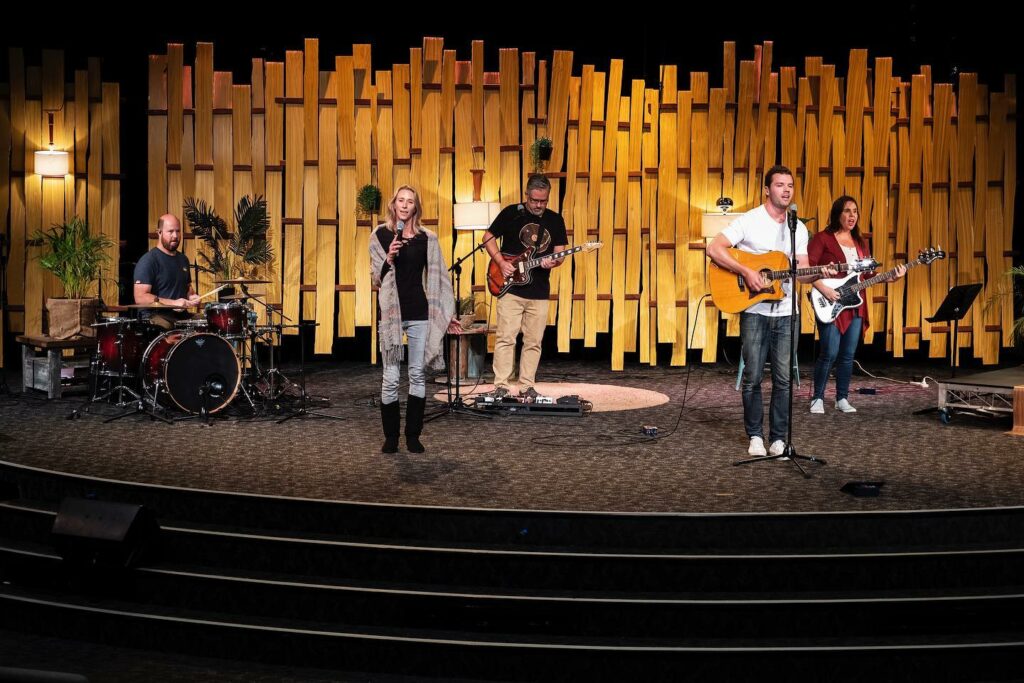About EV Church, Erina
| Location: Erina, NSW | Context: Regional (Coastal) | Denomination: FIEC | Leadership: One senior leader with ministry team |
EV Church Erina
EV Church in Erina on the NSW Central Coast, started in 1996 as an independent church plant, in a lounge room with 10 people. The church has met at school halls most of its life and has seen much growth.
When Andrew Heard and his wife started the church, they strategically selected the location of Erina High School. Their desire was to start in some place central in the Central Coast and Erina is the central location, with the major shopping area, it’s a flow through for people. They describe the surburb and location as very much “a heart point” in the community. So strategically, they wanted to start somewhere that had that position, starting in the high school, then buying land close by, where the current church facility is located today.
Beyond that church congregation, they have planted numbers of churches, and they see themselves as a church planting church.
EV Church is part of a denomination called FIEC, the Fellowship of Independent Evangelical Churches, which Andrew helped form as its President, since its inception around 2008. Andrew describes their church’s style as evangelical, Bible based, reformed in large measure. Though an ordained Anglican minister from Sydney Diocese, Andrew is operating without a license, independent, yet he brings that flavour of theology and shape to his church’s life.
When asked whether their church is flourishing, EV Church says they keep their finger on the pulse of several measures. They ask: Are more people getting saved?; Are people being welcomed and connected into church life well?; Is there is there a warmth and family engagement with new people and established people?; Are people being deepened in the word?; Are they growing in the faith?; and Are they growing in their Godward attentiveness?
Their tendency to measure their growth is clear in their language.. as they continue to check whether their churchgoers growing in a sense of care for one another, and service. They look for evidence of sacrificial service glad-hearted sacrificial service. They ask: Are people more and more stepping in to be captured by the vision of reaching more and growing more, and doing it gladly with energy?; and Are they giving well from a glad heart?
When asked about such intentionality across the team, Andrew describes it as a highly strategic approach. The whole staff team use that same language to measure and check progress. They describe themselves as a purposed church not a generalist pastoral staffed church. Andrew says they choose staff according to the outcomes they want to see. They think of themselves as an outcome driven church, who want to see certain outcomes achieved, and they work towards achieving those outcomes under God.
With such goals in mind, developing a team of leaders is both necessary and evident in their development over the two decades, with the church leadership team now involving twenty five pastoral staff, seven people doing their ‘Ministry Training Scheme’ internships, plus four or five administrative staff.
As part of the denominational executive of the FIEC, Andrew also has a role to provide the leadership on the executive committee that runs FIEC, to facilitate ongoing strategic thinking, vision and leadership for the movement. In recent years that has included lifting the professional standards and policy development.
Andrew describes church health as an ecosystem of church life. For them, the key health and vitality is an ecosystem of all the ministries working well together. So they never think in just terms of one thing they do. It’s as all of those dimensions of church life, of working in a healthy way and in an integrated way, that people emerge within that culture being discipled. They say they haven’t committed to one piece as the disciple-making structure, or one-to-one as the disciple-making structure. They commit to nurturing the health of Godwardness, their services and quality, their growth group structures, they’ve invested heavily in making them work.
In order to do this, the structures and resources have been put in place accordingly. They have set up a lot of intentional leadership development support and pastoral care structures for their growth group structures. A great deal of attention goes into intentionally investing in resourcing those areas of the work that will facilitate building the ecosystem. Andrew describes that overarching intentionality again, in making quite intentional decisions around who and how to resource every part of church life to get it moving and working.
COVID-19 Reflection from EV Church
In 2021, leader Andrew Heard gives us his reflections on how the COVID-19 restrictions have impacted on church life and leadership, as well as an encouragement to other leaders.

Read Andrew’s reflection on the impact of COVID-19 on church life here.
Stories from EV Church
Browse through some of the stories and wisdom that leaders of EV Church shared with us, on how they enliven their ministry and church life.





